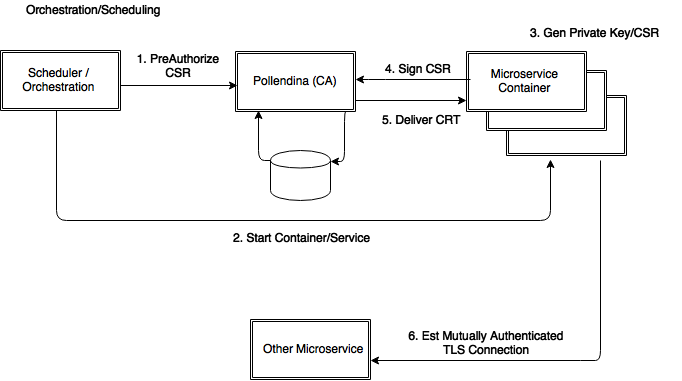Pollendina is an X.509 identity provisioning service designed to simplify mutual TLS authentication for microservices deployed in containers. This project helps you provision your PKI as easily as you provision containers and exposes an API for integration with your existing scheduling / deployment infrastructure.
Pollendina accomplishes this without distribution or centralized management of secrets!
Provisioning a service for use in a new container would consist of the following steps:
- Tell Pollendina that a container for service X at hostname Y is about to be provisioned.
- Provision the container.
- On service initialization, create a new RSA key pair and certificate signing request.
- Call Pollendina with the CSR.
- Pollendina validates that the CSR is approved for provisioning.
- Pollendina signs the CSR with the organization's CA private key and returns the PEM encoded public key for the service in the requesting container (X.509 subject).
- The calling container installs the returned certificate and private key (either keep it in memory or write it encrypted to a volume).
docker run -d -p 33004:33004 -v "$PWD":/opt/pollendina pollendina/pollendina
The above command will start Pollendina in a new container and provision a new CA in the present working directory. The files created at PWD represent the full state of the CA. If Pollendina is stopped, and another Pollendina container is started from this folder it will resume the state of the previous CA. One file named openssl-ca.cnf is created. You can customize the settings for your CA by modifying this file and restarting Pollendina.
Pollendina was consieved in the months leading up to DockerCon 2015. Jeff Nickoloff submitted the idea for a hackathon project based on real world needs he encountered building microservices. During the hackathon he met and was joined by Dário Nascimento, Jason Huddleston, Madhuri Yechuri, and Henry Kendall. Each member of the team brought a unique set of skills and experience. They decided to use Golang where they could, shell and OpenSSL for the especially sensitive portions of the project in an effort to maximize their chances of building a working proof of concept. They worked through the night and Jeff presented the project for the judges the next day. The project took second place.
With a working proof of concept, and a real need for the project in development of other services, Jeff and a few other team members decided to continue development after the conference.
- Jeff Nickoloff
- Dário Nascimento
- Jason Huddleston [Docker newbie]
- Madhuri Yechuri
- Henry Kendall [Docker newbie]
Prior to provisioing a container for a microservice, the provisioning agent should post an authorization to Pollendina at /v1/authorize.
POST /v1/authorize HTTP/1.1
cn=<client common name>&token=<one-time-token>
After the authorization has been registered, the provisioner should pass the token to the new container as an environment variable. That new container will then make the call to /v1/sign/ to retreive a signed certificate.
PUT /v1/sign/<one-time-token>
*include CSR in PUT body*
Pollendina CA can be used / tested standalone, without a client container, using curl client:
curl --data "cn=dario&token=100" http://192.168.59.103:33004/v1/authorize
curl -v http://192.168.59.103:33004/v1/sign/100 --upload-file id.csr
There is a great answer on StackOverflow that goes over running a certificate authority, and creating certificates at: http://stackoverflow.com/questions/21297139/how-do-you-sign-certificate-signing-request-with-your-certification-authority
